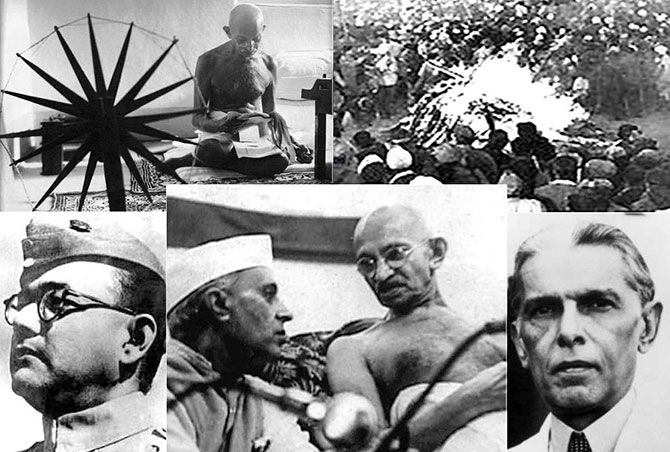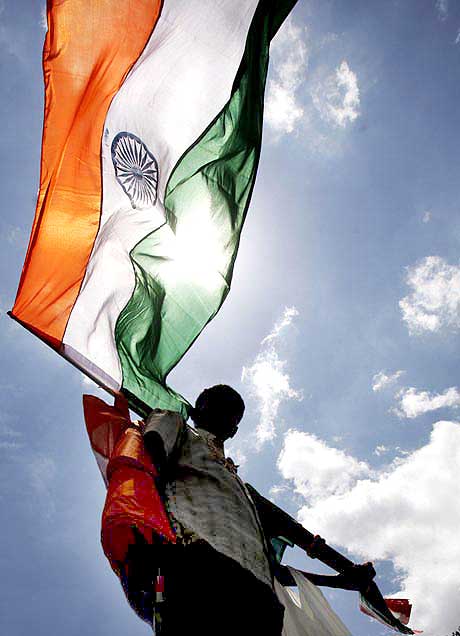Some major events that occurred from 1885, when the Indian National Congress was formed, till August 15, 1947, when India achieved Independence.

1885: The Indian National Congress is launched in Bombay with the aim of winning political rights for Indians.
1905: The Partition of Bengal leads to a massive upsurge among the people, and a call for swadeshi goods, leading to a boycott of British-manufactured goods.
1906: Formation of the Muslim League; Congress gives a call for swaraj (self-rule).
1911: Bengal Partition annulled, announcement that the capital of India to shift from Calcutta to Delhi.
1914-1918: Britain drags India into World War I. Sixty thousand Indians lose their lives in the First Great War.
1915: Mohandas Karamchand Gandhi returns to India from South Africa; he sets up ashram in Ahmedabad the same year, which would shift to the site of the Sabarmati ashram two years later.
1919: Britain seeks to introduce the Rowlatt Act, imposing severe curbs on civil rights. Indians protest. Massacre at Jallianwala Bagh in Amritsar; 400 men, women and children, who had gathered to protest peacefully against the Act, killed.
1921-1922: Gandhi launches the Civil Disobedience Movement, calls for boycott of British goods. Calls off movement a year later due to Chauri Chaura killing where a mob killed policemen.
1924: Moplah riots between Hindus and Muslims.
1927: The British government appoints the Simon Commission to recommend political reforms in India, no Indian is part of the Simon Commission. The Commission is boycotted when it visits India the following year.
1930: Gandhi leads the Salt Satyagraha to protest against the British government's monopoly on salt, forcing the government to amend the law. The Congress boycotts the First Round Table Conference in London.
1931: Second Round Table Conference leads to the Gandhi-Irwin pact that ends the civil disobedience movement and grants some political rights to Indians.
1932: Gandhi concludes the Poona Pact with Dr B R Ambedkar that does away with separate electorates for 'Untouchables,' but reserves some electoral seats for them.
1935: Government of India Act, passed by the British, gives Indian political rights at the provincial level.
1937: Provincial elections. Most provinces elect Congress, some elect Muslim League.
1939: Outbreak of World War II. Viceroy unilaterally declared India's participation in the war, leading to Congress ministries and the Congress boycotting the British in protest.
1941: Subhas Chandra Bose escapes from India, joins hands with the Axis powers in fight against the British.
March 1942: The British War Cabinet announces the Sir Stafford Cripps Mission to negotiate India's political status after the war.
May 1942: Gandhi meets Cripps, but call his proposals a 'post-dated cheque.' Congress rejects the proposals.
August 1942: The Congress leaders meet in Bombay and pass the 'Quit India' resolution calling for complete independence from the British rule. The Congress leadership is arrested; Gandhi is jailed at the Aga Khan Palace in Poona. Revolts break out across India as people defy the British and call for independence. Six hundred demonstrators lose their lives in clashes with the police.
1943: Bose takes charge of the Indian National Army, begins march to India, which is stopped outside Imphal.
1945: World War II ends and the Labour Party, which is sympathetic to India's call for independence, forms the government.
1946: Gandhi-Jinnah talks break down; communal riots break out.
June 1947: The British, Congress and Muslim League agree to Partition and Independence.
August 15, 1947: Independence. Communal riots claim hundreds of thousands in the Partition riots.










